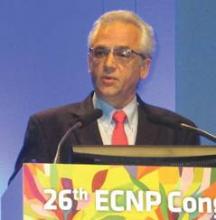BARCELONA – Lurasidone, an atypical antipsychotic approved by the Food and Drug Administration last June for the treatment of depression in patients with bipolar I disorder, has the potential to become a first-line treatment for these patients as physicians grow more familiar and comfortable with the drug, Dr. Joseph R. Calabrese said at the annual Congress of the European College of Neuropsychopharmacology.
In addition to showing significant efficacy for reducing depression in bipolar I patients when used as either monotherapy or as adjunctive therapy in a pair of phase III trials, lurasidone (Latuda) "does not have the metabolic burden caused by some other drugs" used in these patients, and also showed no statistically significant increase in dropout rates compared with placebo. The discontinuation rate because of adverse effects was especially low when the drug was administered at a dosage of 20-60 mg/day. This safety finding is "remarkable," said Dr. Calabrese, professor of psychiatry and head of the mood disorders program at Case Western Reserve University in Cleveland.
The results from the two phase III trials provide "unequivocal evidence that the drug has short-term efficacy for patients with depressive episodes in bipolar I disorder. I think the evidence is very persuasive," Dr. Calabrese said in an interview. "I think this drug will be used adjunctively at first, but with more familiarity, physicians will start using it up front. The No. 1 attraction for first-line therapy is no metabolic burden; that’s a huge issue. And sedation is minimal." Dr. Calabrese stressed that the trial results showed no dropouts because of sedation, and 10%-15% of patients reported a sedation effect, compared with the 40% rate typically seen with lamotrigine (Lamictal).
One of the trials assessed lurasidone as an adjunctive treatment in 340 patients already on treatment with lithium or valproate. After 6 weeks, patients on lurasidone plus one of the other drugs had an average drop from baseline in their Montgomery-Åsberg Depression Rating Scale (MADRS) score of 17.1 points, compared with an average 13.5-point drop in the control patients who were on lithium or valproate plus placebo, a statistically significant difference. Fifty-seven percent of the 179 patients receiving lurasidone had at least a 50% drop in their MADRS score, compared with 42% of 161 patients in the control arm. Remission – achievement of a MADRS score of 12 or less – occurred in half the lurasidone patients and 35% of the controls.
Also notable was the impact the drug had on the 10 individual components of the MADRS score. Six of these 10 items showed statistically significant reductions with lurasidone treatment, including the two core measures of depression, apparent sadness and reported sadness.
The second trial tested lurasidone as monotherapy, at two different dosages, either 20-60 mg/day or 80-120 mg/day, and both were compared with placebo during 6 weeks of treatment, with a total of 485 patients randomized and completing 6 weeks on treatment. Lurasidone resulted in a similar pattern of efficacy, with 42% (lower dosage) and 40% of patients having their MADRS score drop to 12 points or less, compared with a 25% remission rate in the placebo group. Both dosages of lurasidone led to statistically significant reductions in 7 of the 10 MADRS component measures compared with the control arm.
The monotherapy study also showed that while the lower lurasidone dosage was just as effective as the higher dosage, it was more tolerable, with lower rates of akathisia and extrapyramidal symptoms. Lurasidone appears to produce low rates of sedation, appetite stimulation, and weight gain because of its negligible binding to the histamine1 receptor, Dr. Calabrese said. In the adjunctive study, lurasidone treatment resulted in virtually no change in weight or body mass index, and very small changes in cholesterol, triglycerides, and fasting glucose.
The two trials were sponsored by Sunovion, the company that markets lurasidone. Dr. Calabrese said he has been a consultant to and has received research support from Sunovion as well as from more than a dozen other drug companies.
On Twitter @mitchelzoler


